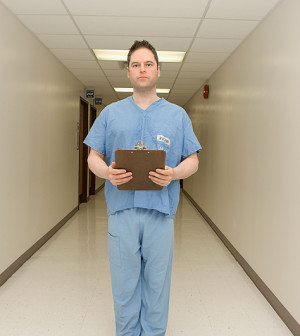- Could Your Grocery Store Meat Be Causing Recurring UTIs?
- Are You Making This Expensive Thermostat Error This Winter?
- Recognizing the Signs of Hypothyroidism
- 10 Strategies to Overcome Insomnia
- Could Artificial Sweeteners Be Aging the Brain Faster?
- Techniques for Soothing Your Nervous System
- Does the Water in Your House Smell Funny? Here’s Why
- Can a Daily Dose of Apple Cider Vinegar Actually Aid Weight Loss?
- 6 Health Beverages That Can Actually Spike Your Blood Sugar
- Treatment Options for Social Anxiety Disorder
A Doctor’s Words Key to Whether Child Gets HPV Vaccine

The language doctors use when recommending the human papillomavirus (HPV) vaccine can influence whether parents will have their children immunized, a new study finds.
HPV causes most cases of cervical cancer and a large percentage of vaginal, vulvar, anal, penile and oropharyngeal cancers.
The U.S. Centers for Disease Control and Prevention recommends boys and girls receive the three-dose HPV vaccination beginning at age 11 or 12.
As of 2015, only 42 percent of girls and 28 percent of boys ages 13 to 17 had completed the HPV vaccine series, according to the CDC.
Previous research found that doctors’ recommendations play a major role in whether parents have their children vaccinated.
In this new study, researchers examined if specific language used by doctors affects parents’ decisions.
The study included more than 1,500 parents. Their children were between the ages of 11 to 17. The study also included 776 primary care doctors.
Parents were asked whether specific messages — including nine longer ones developed by the CDC and six brief messages developed by the study team — would persuade them to have their children vaccinated.
Seventy percent of parents said they’d support messages that emphasized the effectiveness of the vaccine. About two-thirds of parents said they would support messages about the cancers prevented by the vaccine and the safety of the vaccine. Three of the brief messages and eight of the longer messages were supported by at least half of the parents.
Doctors were only asked to review the six brief messages. They were asked whether they would use them in an attempt to persuade parents to get the HPV vaccine for their children.
Physicians were most likely to support messages that emphasized the fact that the vaccine can prevent cancer (64 percent), the study found.
The message most parents and doctors believed was persuasive for the HPV vaccine was: “I strongly believe in the importance of this cancer-preventing vaccine for [child’s name].”
The study was published Sept. 30 in the journal Cancer Epidemiology, Biomarkers & Prevention.
Some parents who initially said they didn’t intend to vaccinate their children against HPV eventually said at least one of the messages would motivate them to agree to vaccination.
Among these parents, the most effective messages were those that emphasized parents’ role in preventing their child from getting HPV-related cancers and those that highlighted parents’ role in whether their child becomes infected with HPV.
Previous research has shown that most parents who don’t allow their children to get HPV vaccination do so due to lack of information. Parents might also choose not to vaccinate for HPV due to a belief that the vaccination is unnecessary or unsafe, or because they didn’t receive a strong recommendation from their child’s physician, according to study author Teri Malo. She’s a postdoctoral research associate at University of North Carolina at Chapel Hill.
“Each of these concerns can be addressed by talking with a [health care] provider, and so it’s important to understand what drives parents’ hesitation so that we can help improve provider communication to decrease hesitancy about HPV vaccine,” Malo said in a journal news release.
“This finding really highlights the important role that parent-provider communication can play in increasing HPV vaccination,” she concluded.
More information
The U.S. Centers for Disease Control and Prevention has more on HPV vaccine.
Source: HealthDay
Copyright © 2026 HealthDay. All rights reserved.










